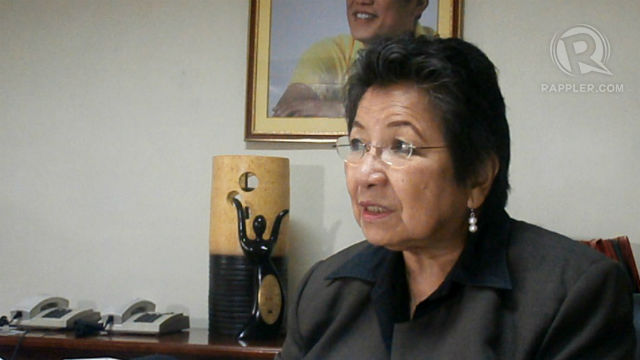SUMMARY
This is AI generated summarization, which may have errors. For context, always refer to the full article.

MANILA, Philippines – The Commisson on Human Rights (CHR) has decided to document hate crimes against Lesbians, Gays, Bisexuals, and Transgenders (LGBTs) across the country.
In an interview with Rappler, CHR Chairperson Loretta “Etta” Rosales said hate crimes deserve extra attention given their nature.
“These are not just common crimes. They (the victims) belong to the marginal and discriminated sectors of society. These are people who are discriminated against — binaril, tinotorture, ninanakawan — dahil galit dahil sa sexual orientation niya,” Rosales explained. (These are people who are discriminated against — shot, tortured, robbed — because of anger over his or her sexual orientation.)
The CHR chair said data are being pooled from different CHR offices in the province, adding that the resulting database will eventually have a digital version.
“Pero ang balak talaga namin (What we intent to do) is to digitize it later on and even make it scientific, so that it becomes evidence-based, and we can investigate the forms of abuse,” she said in a phone interview.
The CHR intends to eventually use the online platform to call attention to the issue of crimes motivated by hate directed at sexual orientation and gender identity (SOGI).
A similar effort was done by the agency for cases of human rights violations during the Martial Law period.
Rosales is hopeful that the move will eventually lead to better prosecution and investigation of hate crimes based on SOGI, describing them as “gross violations of human rights.”
Hate crimes in the Philippines
According to data collated by the Philippine LGBT Hate Crime Watch, there have been around 164 cases of murdered LGBTs in the country from 1996 to June 2012.
Until the planned CHR documentation, LGBT rights advocates have depended solely on independent reports which, they say, are but a glimpse of the real situation of gender-related hate crime incidence in the country.
READ: LGBTs push for end to hate crimes
Rosales said they will look closely into the facts of each case, without being swayed by public opinion.
“We have to be really objective about this. It has to be factual, talagang may kaso siya (there has to be a real case). Kasi pag evidence-based, magagamit itong mga kasong ito para ipaglaban yung interest ng mga naapi,” she said. (If it is evidence-based, these cases can be used to fight for the interest of the abused parties.)
LGBT rights advocates have previously called on the government to conduct a congressional inquiry on LGBT-targeted hate crimes in aid of legislation. The probe, they said, will help determine additional preventive and punitive measures needed to address the issue.
Attitudes towards LGBTs
Petersen Vargas, who produces films focused on the narratives of LGBTs, said there is little benefit from the CHR documentation if there is no proper prosecution of the crimes.
“Realistically speaking, such moves are bound to be drowned by the general failure of a bigger system — our judiciary. Let’s face it, our justice system is already problematic as it is, and such motives to give what is due for minorities make little difference,” said Vargas.
Vargas said, however, that the “little difference” that the documentation will make is already a cause for celebration.
“This move may be able to mainstreamize or popularize the LGBT issue, and in turn, will propagate wider acceptance for this minority,” said the young filmmaker.
Raffy Magno, a Rappler Ambassador and an LGBT rights advocate, said most gays are still confronted with an obligation to explain — “why we are gay, why some of us don’t use make-up, why some of us want to undergo sex change, why some of us can have sex with both sexes” — as if their lifestyle needed approval before it can be lived out.
“In a society where discrimination and stereotyping are still rampant, in a church that has a lot of biases against the LGBT, it is difficult and challenging for us to live an equal life with the ‘straights,'” he said.
READ: Is the Philippines really gay-friendly?
Despite the challenges, Magno said there is reason for those who are “gay, loud and proud” to be more hopeful.
“The Philippines has become more mature and more open on issues that involve the LGBT community. We now have a party-list (organization) that forwards our rights, a teleserye that shows our colorful and exigent love story, and a bunch of people and organizations that fight and share the realities of being gay in the Philippines,” he said. – Rappler.com
Add a comment
How does this make you feel?
There are no comments yet. Add your comment to start the conversation.